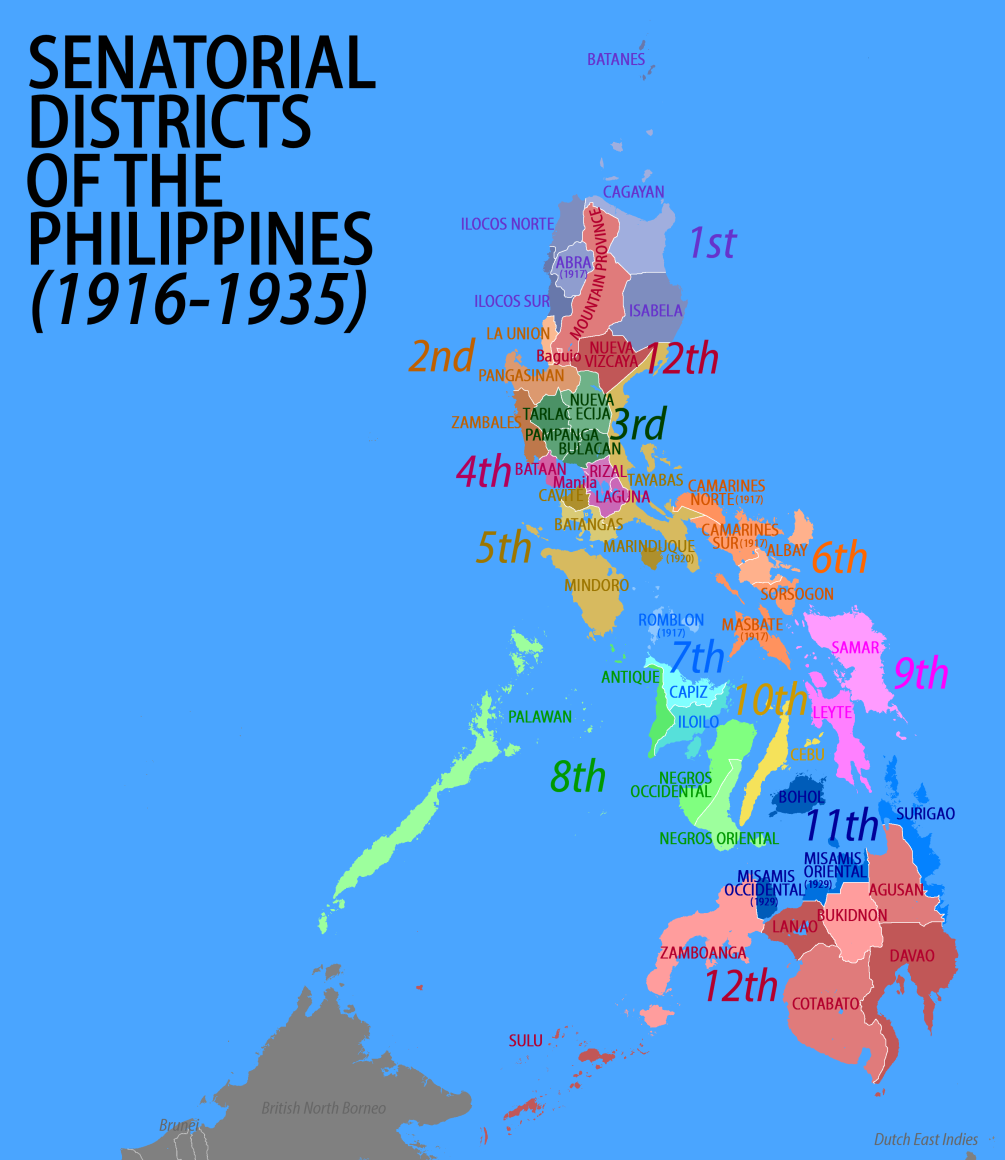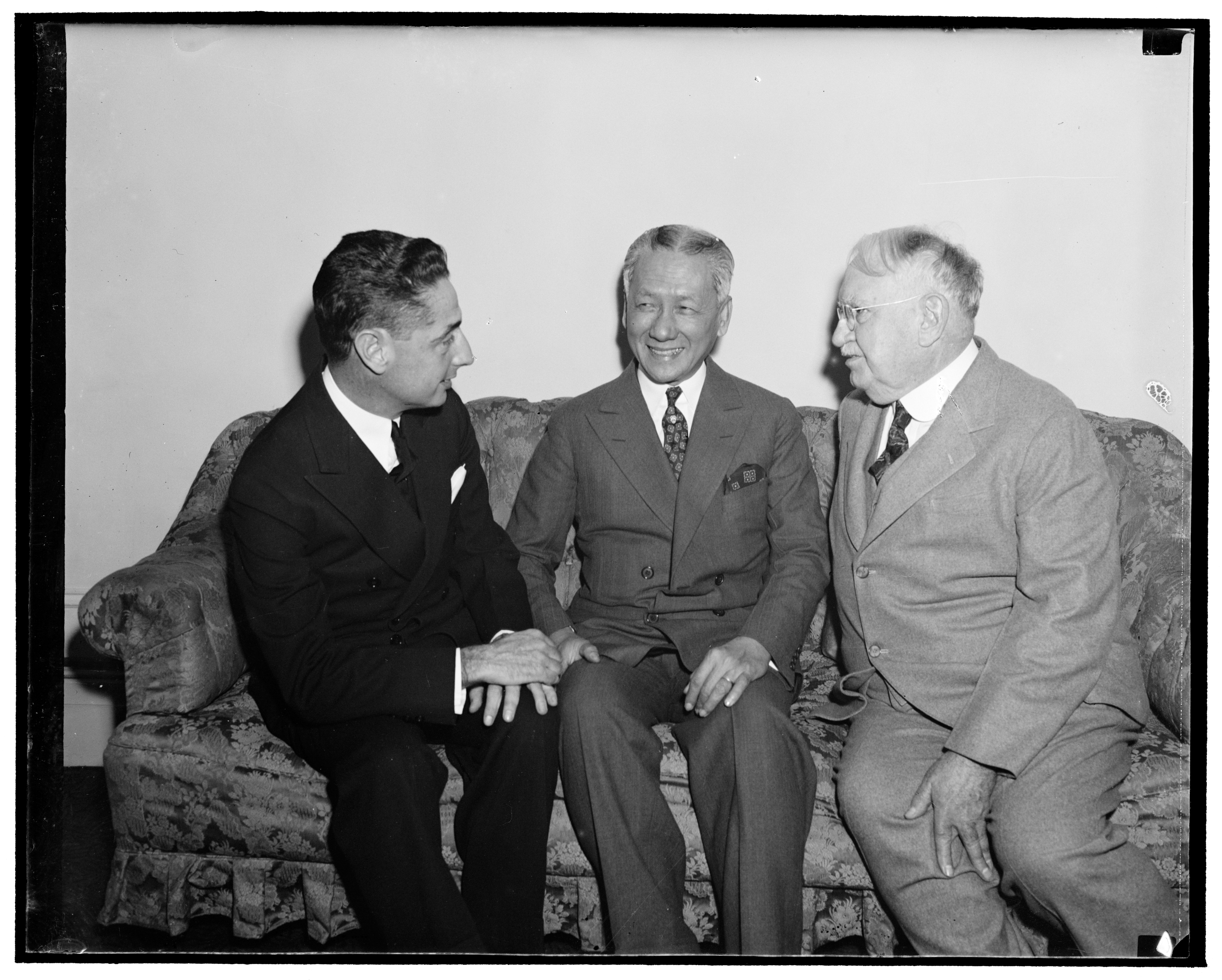|
Philippines's 4th Senatorial District
Philippines's 4th senatorial district, officially the Fourth Senatorial District of the Philippine Islands ( es, Cuarto Distrito Senatorial de las Islas Filipinas), was one of the twelve senatorial districts of the Philippines in existence between 1916 and 1935. It elected two members to the Senate of the Philippines, the upper chamber of the bicameral Philippine Legislature under the Insular Government of the Philippine Islands for each of the 4th to 10th legislatures. The district was created under the 1916 Jones Law from the capital Manila and adjacent provinces in south-central Luzon, namely Bataan, Laguna and Rizal. The district was represented by a total of seven senators throughout its existence. It was abolished in 1935 when a unicameral National Assembly was installed under a new constitution following the passage of the Tydings–McDuffie Act which established the Commonwealth of the Philippines. Since the 1941 elections when the Senate was restored after a constituti ... [...More Info...] [...Related Items...] OR: [Wikipedia] [Google] [Baidu] |
Senatorial Districts Of The Philippines
The senatorial districts of the Philippines were the representations of the provinces of the Philippines in the Philippine Senate from 1916 to 1935. History The enactment of the Philippine Autonomy Act (popularly known as "Jones Law") in August 1916 by the United States Congress provided for the creation of a bicameral legislature consisting of a lower chamber (House of Representatives) and an upper chamber (Senate). Until then the Philippine Commission held the executive power and some legislative powers over the American colony. The system of government of the Philippines in its early years of transition to democratic self-government was deliberately structured to emulate the American model. The Philippines thus followed the American system of electing the members of the 24-seat senate by district. The districts were organized and numbered in a roughly north–south fashion, much like the present administrative regions. The first eleven districts were composed of establish ... [...More Info...] [...Related Items...] OR: [Wikipedia] [Google] [Baidu] |
At-large
At large (''before a noun'': at-large) is a description for members of a governing body who are elected or appointed to represent a whole membership or population (notably a city, county, state, province, nation, club or association), rather than a subset. In multi-hierarchical bodies the term rarely extends to a tier beneath the highest division. A contrast is implied, with certain electoral districts or narrower divisions. It can be given to the associated territory, if any, to denote its undivided nature, in a specific context. Unambiguous synonyms are the prefixes of cross-, all- or whole-, such as cross-membership, or all-state. The term is used as a suffix referring to specific members (such as the U.S. congressional Representative/the Member/Rep. for Wyoming ''at large''). It figures as a generic prefix of its subject matter (such as Wyoming is an at-large U.S. congressional district, at present). It is commonly used when making or highlighting a direct contrast with sub ... [...More Info...] [...Related Items...] OR: [Wikipedia] [Google] [Baidu] |
7th Philippine Legislature
The Seventh Philippine Legislature was the meeting of the legislature of the Philippines under the sovereign control of the United States from 1925 to 1928. Members Senate Notes House of Representatives Notes See also *Congress of the Philippines *Senate of the Philippines *House of Representatives of the Philippines The House of Representatives of the Philippines ( fil, Kapulungan ng mga Kinatawan ng Pilipinas, italic=unset, ''Kamara'' or ''Kamara de Representantes'' from the Spanish language, Spanish word ''cámara'', meaning "chamber") is the lower house ... External links * * Further reading *Philippine House of Representatives Congressional Library * * {{Philippine legislative periods 07 ... [...More Info...] [...Related Items...] OR: [Wikipedia] [Google] [Baidu] |
6th Philippine Legislature
The Sixth Philippine Legislature was the meeting of the legislature of the Philippines under the sovereign control of the United States from 1922 to 1925. Members Senate Notes House of Representatives Notes See also *Congress of the Philippines *Senate of the Philippines *House of Representatives of the Philippines The House of Representatives of the Philippines ( fil, Kapulungan ng mga Kinatawan ng Pilipinas, italic=unset, ''Kamara'' or ''Kamara de Representantes'' from the Spanish language, Spanish word ''cámara'', meaning "chamber") is the lower house ... External links * * Further reading *Philippine House of Representatives Congressional Library * * {{Philippine legislative periods 06 ... [...More Info...] [...Related Items...] OR: [Wikipedia] [Google] [Baidu] |
1922 Philippine Senate Elections
Senatorial elections were held on June 6, 1922 in the Philippines under the Jones Law provisions. It was controversial when Senate President Manuel L. Quezon accused Sergio Osmeña of using public funds in campaigning which resulted to the Nacionalista Party to be split. Electoral system In a staggered election, the seats of the senators who were first place in 1916 were up for election. The Philippines is divided into 12 senatorial districts, of which all districts save for the 12th district, has one of its seats up. In the 12th district, any vacancy is filled via appointment of the Governor-General. The election itself is via first-past-the-post. Results See also * 6th Philippine Legislature *Commission on Elections *Politics of the Philippines *Philippine elections External linksOfficial website of the Commission on Elections {{Philippine elections 1922 Events January * January 7 – Dáil Éireann (Irish Republic), Dáil Éireann, the parliament of the I ... [...More Info...] [...Related Items...] OR: [Wikipedia] [Google] [Baidu] |
Demócrata Party
The Democrata Party, also known as ''Partido Democrata Nacional'' () was a political party in early 20th century Philippines, when the Philippines was an insular territory of the United States. It functioned as an opposition party against the ruling Nacionalista Party. History The Democrata Party came from the remnants of the Progresista Party, which had been defeated by the Nacionalistas. Juan Sumulong founded the Democrata party in 1917, espousing "''absolute and immediate independence''". In the 1922 election, the Nacionalistas were split into two camps: Senate President Manuel L. Quezon pushed for collective leadership, calling Speaker Sergio Osmeña's leadership style as "''unipersonal''", a charge Osmeña denied. Thus, Quezon and his allies were the "Colectivistas", while Osmeña and his allies were the "Unipersonalistas". Osmeña decided to run for the Senate, directly challenging Quezon's authority. This led to the Nacionalistas losing their majority in the House of Re ... [...More Info...] [...Related Items...] OR: [Wikipedia] [Google] [Baidu] |
Resident Commissioner Of The Philippines
The resident commissioner of the Philippines () was a non-voting member of the United States House of Representatives sent by the Philippines from 1907 until its internationally recognized independence in 1946. It was similar to current non-voting members of Congress such as the resident commissioner of Puerto Rico and delegates from Washington, D.C., Guam, the Northern Mariana Islands and other territories of the United States. Like current non-voting members, resident commissioners could speak and otherwise participate in the business of the House, but did not have full voting rights. Two resident commissioners were sent until 1937, when after the establishment of the Commonwealth of the Philippines, the number was changed to one. History The Philippines was a United States territory from 13 August 1898 until Philippine independence was internationally recognized on 4 July 1946. The office was first created by the Philippine Organic Act of 1902, section 8 and re-authorize ... [...More Info...] [...Related Items...] OR: [Wikipedia] [Google] [Baidu] |
1919 Philippine Senate Elections
Senatorial elections happened on June 3, 1919 in the Philippines under the Jones Law provisions. There were 717,295 registered voters, of whom 672,122, or 92 percent, voted. Electoral system In a staggered election, the seats of the senators who were second place in 1916 were up for election. The Philippines is divided into 12 senatorial districts, of which all districts save for the 12th district, has one of its seats up. In the 12th district, any vacancy is filled via appointment of the Governor-General. The election itself is via first-past-the-post. Results See also *5th Philippine Legislature *Commission on Elections *Politics of the Philippines *Philippine elections External linksOfficial website of the Commission on Elections {{Philippine elections 1919 Events January * January 1 ** The Czechoslovak Legions occupy much of the self-proclaimed "free city" of Pressburg (now Bratislava), enforcing its incorporation into the new republic of Czechoslovakia. ... [...More Info...] [...Related Items...] OR: [Wikipedia] [Google] [Baidu] |
5th Philippine Legislature
The Fifth Philippine Legislature was the meeting of the legislature of the Philippines under the sovereign control of the United States from 1919 to 1922. Members Senate Notes House of Representatives Notes See also *Congress of the Philippines *Senate of the Philippines *House of Representatives of the Philippines The House of Representatives of the Philippines ( fil, Kapulungan ng mga Kinatawan ng Pilipinas, italic=unset, ''Kamara'' or ''Kamara de Representantes'' from the Spanish language, Spanish word ''cámara'', meaning "chamber") is the lower house ... External links * * Further reading *Philippine House of Representatives Congressional Library * * {{Philippine legislative periods 05 ... [...More Info...] [...Related Items...] OR: [Wikipedia] [Google] [Baidu] |
Pedro Guevara
Pedro Guevara y Valenzuela (February 23, 1879 – January 19, 1938), was a Filipino soldier, lawyer, legislator, and Spanish writer who became Resident Commissioner of the Philippines during the American Occupation. Early life Pedro Guevara was born in Santa Cruz, Laguna, Philippines on February 23, 1879 to Miguel Guevara and María Valenzuela. Education Guevara attended Ateneo Municipal de Manila and graduated from Colegio de San Juan de Letran, Manila in 1896. Philippine Revolution Guevara joined the Filipino forces during the Philippine Revolution and assisted in promoting the peace agreement of the ''Biak na Bato'' at San Miguel, Bulacan, in 1897. He later rejoined the Filipino forces during the revolution, and also served throughout the Spanish–American War and the Philippine–American War, attaining the rank of lieutenant colonel. He was the aide and private secretary to General Juan Cailles. Political career Later, Guevara became a journalist for the Spanish lan ... [...More Info...] [...Related Items...] OR: [Wikipedia] [Google] [Baidu] |
1916 Philippine Senate Elections
The first-ever elections to Philippine Senate were held on October 3, 1916, immediately after the passage of the Philippine Autonomy Act, known as the Jones Law. The Act created the Senate of the Philippines. The Senate replaced the Philippine Commission as the upper house of the Philippine Legislature, thus creating for the first time a fully elected national legislative branch in the Philippines, under the American colonial Insular Government. Each district elected two senators (plurality-at-large): The first-placer was to serve a six-year term while the second-placer was to serve a three-year term. On each election thereafter, one seat per district was up (first past the post). The senators from the 12th district were appointed by the American governor-general for no fixed term. Results References * * See also * 4th Philippine Legislature {{Philippine elections 1916 Events Below, the events of the First World War have the "WWI" prefix. January * Janua ... [...More Info...] [...Related Items...] OR: [Wikipedia] [Google] [Baidu] |
Rafael Palma
Rafael Palma y Velásquez (: October 24, 1874 May 24, 1939) was a Filipino politician, Rizalian, writer, educator and a famous Freemason. He was a senator from 1916 to 1921 and was the fourth president of the University of the Philippines. Biography Palma was born in Manila on October 24, 1874 to ''Don'' Hermógenes Palma, a clerk at the ''Intendencia'' Office, and Hilaria Velásquez. His younger brother was the soldier-poet José Palma, the author of the Spanish poem ''Filipinas'', which is, along with its subsequent translations, used in the Philippine National Anthem. In 1885, he began his studies at the Ateneo de Manila and graduated with a Bachelor of Arts degree. In 1892, he began his law studies at the University of Santo Tomas. While enrolled in the university, he was employed in the Office of the Bureau of Lands. He was also a reporter in ''La Independencia'', the first Filipino daily newspaper, founded and directed by Antonio Luna. When Luna died in 1899, Palma assum ... [...More Info...] [...Related Items...] OR: [Wikipedia] [Google] [Baidu] |



